| Listing 1 - 10 of 14 | << page >> |
Sort by
|
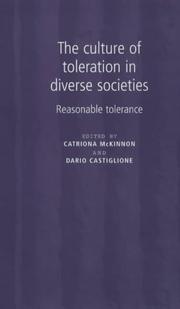
ISBN: 0719062322 9780719080623 9786610734177 1847790453 1280734175 1417582715 0719080622 9781847790453 9781417582716 1526137704 9780719062322 9781280734175 Year: 2003 Publisher: Manchester ; New York : Manchester University Press,
Abstract | Keywords | Export | Availability | Bookmark
 Loading...
Loading...Choose an application
- Reference Manager
- EndNote
- RefWorks (Direct export to RefWorks)
The idea of toleration as the appropriate response to difference has been central to liberal thought since Locke. Although the subject has been widely and variously explored, there has been reluctance to acknowledge the new meaning that current debates on toleration have when compared with those at its origins in the early modern period and with subsequent discussions about pluralism and freedom of expression. This collection starts from a clear recognition of the new terms of the debate. It recognises that a new academic consensus is slowly emerging on a view of tolerance that is reasonable in two senses. Firstly of reflecting the capacity of seeing the other's viewpoint, secondly on the relatively limited extent to which toleration can be granted. It reflects the cross-thematic and cross-disciplinary nature of such discussions, dissecting a number of debates such as liberalism and communitarianism, public and private, multiculturalism and the politics of identity, and a number of disciplines: moral, legal and political philosophy, historical and educational studies, anthropology, sociology and psychology. A group of distinguished authors explore the complexities emerging from the new debate. They scrutinise, with analytical sophistication, the philosophical foundation, the normative content and the broadly political implications of a new culture of toleration for diverse societies. Specific issues considered include the toleration of religious discrimination in employment, city life and community, social ethos, publicity, justice and reason and ethics. The book is unique in resolutely looking forward to the theoretical and practical challenges posed by commitment to a conception of toleration demanding empathy and understanding in an ever-diversifying world.
Cultural pluralism. --- Toleration. --- Cultural diversity --- Diversity, Cultural --- Diversity, Religious --- Ethnic diversity --- Pluralism (Social sciences) --- Pluralism, Cultural --- Religious diversity --- Culture --- Cultural fusion --- Ethnicity --- Multiculturalism --- Bigotry --- Intolerance --- Tolerance --- Virtues --- Discrimination --- tolerance --- racism --- discrimination --- Democracy --- Epistemology --- Ethics --- John Rawls --- Laïcité --- Liberalism --- Religious pluralism
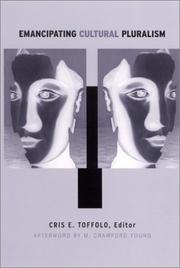
ISBN: 1417524006 0791487490 1417524006 9781417524006 0791455971 9780791455975 079145598X 9780791455982 9780791487495 Year: 2003 Publisher: Albany : State University of New York Press,
Abstract | Keywords | Export | Availability | Bookmark
 Loading...
Loading...Choose an application
- Reference Manager
- EndNote
- RefWorks (Direct export to RefWorks)
Combining detailed case studies with discussions of deeper theoretical controversies, Emancipating Cultural Pluralism investigates both the benign and harmful aspects of identity politics. This provocative collection delves into some of the most difficult issues of cultural pluralism, such as what accounts for the immense power of identity politics, whether identity politics can be inherently good or evil, whether states are the right institutions to deal with ethnic conflict, the prevention of genocide, the value of devolving power to the local level, and more. The contributions are united by the conviction that more attention needs to be paid to the normative issues associated with various expressions of cultural pluralism, for the ethical implications of the phenomena are too profound to be ignored.
Cultural pluralism. --- Multiculturalism. --- Cultural diversity --- Diversity, Cultural --- Diversity, Religious --- Ethnic diversity --- Pluralism (Social sciences) --- Pluralism, Cultural --- Religious diversity --- Culture --- Cultural fusion --- Ethnicity --- Multiculturalism --- Cultural diversity policy --- Cultural pluralism --- Cultural pluralism policy --- Ethnic diversity policy --- Social policy --- Anti-racism --- Government policy
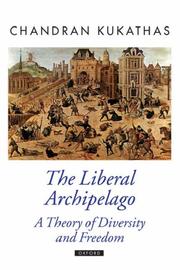
ISBN: 0199219206 1282052985 9786612052989 0191531502 Year: 2003 Publisher: Oxford ; New York : Oxford University Press,
Abstract | Keywords | Export | Availability | Bookmark
 Loading...
Loading...Choose an application
- Reference Manager
- EndNote
- RefWorks (Direct export to RefWorks)
Chandran Kukathas offers an examination of this controversial theory of minority rights. He argues that the free society should not be seen as a hierarchy of superior and subordinate authorities but an archipelago of competing and overlapping jurisdictions.
Multiculturalism --- Minorities --- Liberalism. --- Cultural pluralism. --- Philosophy. --- Civil rights. --- Cultural diversity --- Diversity, Cultural --- Diversity, Religious --- Ethnic diversity --- Pluralism (Social sciences) --- Pluralism, Cultural --- Religious diversity --- Culture --- Cultural fusion --- Ethnicity --- Liberal egalitarianism --- Liberty --- Political science --- Social sciences --- Minority rights --- Cultural diversity policy --- Cultural pluralism --- Cultural pluralism policy --- Ethnic diversity policy --- Social policy --- Anti-racism --- Government policy
Periodical
Abstract | Keywords | Export | Availability | Bookmark
 Loading...
Loading...Choose an application
- Reference Manager
- EndNote
- RefWorks (Direct export to RefWorks)
Examining the manifestations of difference and social practices of diversity₂material (class, locale), corporeal (age, race, sex and sexuality and body form) and symbolic (culture, language, gender, family, affinity and persona).
Cultural pluralism --- Multiculturalism --- Ethnicity --- Cultural pluralism. --- Ethnicity. --- Multiculturalism. --- Ethnic identity --- Group identity --- Cultural fusion --- Cultural diversity policy --- Cultural pluralism policy --- Ethnic diversity policy --- Social policy --- Anti-racism --- Cultural diversity --- Diversity, Cultural --- Diversity, Religious --- Ethnic diversity --- Pluralism (Social sciences) --- Pluralism, Cultural --- Religious diversity --- Culture --- Government policy
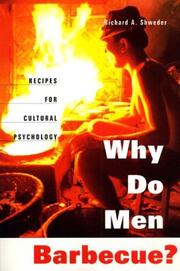
ISBN: 0674010574 067401135X Year: 2003 Publisher: Cambridge, Mass. : Harvard University Press,
Abstract | Keywords | Export | Availability | Bookmark
 Loading...
Loading...Choose an application
- Reference Manager
- EndNote
- RefWorks (Direct export to RefWorks)
Ethnopsychology. --- Cultural pluralism --- Multiculturalism. --- Ethnopsychologie --- Diversité culturelle --- Multiculturalisme --- Cultural pluralism. --- 39 --- Cultural diversity policy --- Cultural pluralism policy --- Ethnic diversity policy --- Multiculturalism --- Social policy --- Anti-racism --- Ethnicity --- Cultural fusion --- Cultural diversity --- Diversity, Cultural --- Diversity, Religious --- Ethnic diversity --- Pluralism (Social sciences) --- Pluralism, Cultural --- Religious diversity --- Culture --- Cross-cultural psychology --- Ethnic groups --- Ethnic psychology --- Folk-psychology --- Indigenous peoples --- National psychology --- Psychological anthropology --- Psychology, Cross-cultural --- Psychology, Ethnic --- Psychology, National --- Psychology, Racial --- Race psychology --- Psychology --- National characteristics --- Volkenkunde. Zeden en gebruiken. Culturele antropologie --- Government policy --- 39 Volkenkunde. Zeden en gebruiken. Culturele antropologie --- Diversité culturelle --- Ethnopsychology
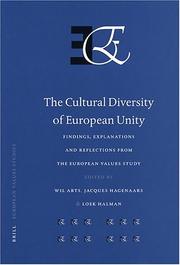
ISSN: 15685926 ISBN: 9004122990 9786610464951 1417507187 128046495X 9047400038 9781417507184 9789004122994 Year: 2003 Volume: 6 Publisher: Leiden Brill
Abstract | Keywords | Export | Availability | Bookmark
 Loading...
Loading...Choose an application
- Reference Manager
- EndNote
- RefWorks (Direct export to RefWorks)
This work deals with the values of the people in contemporary Europe. Using the survey data from the European Values Study, a number of basic values and the dynamics of value change are explored from an economic, political, social, and religious-moral point of view.
Pluralism (Social sciences) --- Social change --- Values --- Civil society --- Group identity --- European Union. --- Cultural pluralism --- Philosophical anthropology --- Sociology of culture --- European Union --- Axiology --- Worth --- Aesthetics --- Knowledge, Theory of --- Metaphysics --- Psychology --- Ethics --- Change, Social --- Cultural change --- Cultural transformation --- Societal change --- Socio-cultural change --- Social history --- Social evolution --- Cultural diversity --- Diversity, Cultural --- Diversity, Religious --- Ethnic diversity --- Pluralism, Cultural --- Religious diversity --- Culture --- Cultural fusion --- Ethnicity --- Multiculturalism --- Social contract --- E.U. --- Pluralism (Social sciences) - European Union countries. --- Social change - European Union countries. --- Values - Europe. --- Civil society - Europe. --- Group identity - Europe.
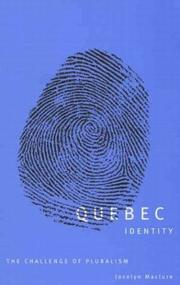
ISBN: 077352553X 077352598X Year: 2003 Publisher: Montreal : McGill-Queen's University Press,
Abstract | Keywords | Export | Availability | Bookmark
 Loading...
Loading...Choose an application
- Reference Manager
- EndNote
- RefWorks (Direct export to RefWorks)
#SBIB:39A6 --- #SBIB:39A74 --- #SBIB:316.7C140 --- Etniciteit / Migratiebeleid en -problemen --- Etnografie: Amerika --- Cultuursociologie: cultuur en globale samenlevingen --- Cultural pluralism --- Ethnicity --- French-Canadians --- Multiculturalism --- Nationalism --- Consciousness, National --- Identity, National --- National consciousness --- National identity --- International relations --- Patriotism --- Political science --- Autonomy and independence movements --- Internationalism --- Political messianism --- Cultural diversity policy --- Cultural pluralism policy --- Ethnic diversity policy --- Social policy --- Anti-racism --- Cultural fusion --- Canadians, Francophone --- Canadians, French-speaking --- Francophone Canadians --- French-speaking Canadians --- Canadians --- Ethnic identity --- Group identity --- Cultural diversity --- Diversity, Cultural --- Diversity, Religious --- Ethnic diversity --- Pluralism (Social sciences) --- Pluralism, Cultural --- Religious diversity --- Culture --- Government policy --- Québec (Province) --- Civilization. --- Ethnic relations. --- Ethnicité --- Nationalisme --- Multiculturalisme --- Pluralisme
Book
ISBN: 9789504001836 9504001831 Year: 2003 Publisher: Madrid Alianza
Abstract | Keywords | Export | Availability | Bookmark
 Loading...
Loading...Choose an application
- Reference Manager
- EndNote
- RefWorks (Direct export to RefWorks)
Cultura de Iberoamérica. --- Emigration and immigration --- Exilio de Iberoamérica. --- Exilliteratur. --- Intellectual life. --- Multiculturalism --- Multiculturalism. --- Multikulturelle Gesellschaft. --- Social aspects. --- Lateinamerika. --- Latin America --- Latin America. --- Social aspects --- Intellectual life --- Cultural pluralism --- Emigration and immigration in literature --- 325 <8> --- Cultural diversity --- Diversity, Cultural --- Diversity, Religious --- Ethnic diversity --- Pluralism (Social sciences) --- Pluralism, Cultural --- Religious diversity --- Culture --- Cultural fusion --- Ethnicity --- 325 <8> Landverhuizing. Kolonisatie. Immigratie. Emigratie --(politiek)--Zuid-Amerika --- Landverhuizing. Kolonisatie. Immigratie. Emigratie --(politiek)--Zuid-Amerika --- Asociación Latinoamericana de Libre Comercio countries --- Neotropical region --- Neotropics --- New World tropics --- Spanish America
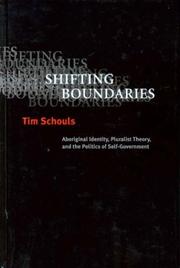
ISBN: 0774810467 9780774810463 0774810475 9780774810470 9780774851947 0774851945 1283330644 9781283330640 9786613330642 Year: 2003 Publisher: Vancouver : UBC Press,
Abstract | Keywords | Export | Availability | Bookmark
 Loading...
Loading...Choose an application
- Reference Manager
- EndNote
- RefWorks (Direct export to RefWorks)
Canada is often called a pluralist state, but few commentators view Aboriginal self-government from the perspective of political pluralism. Instead, Aboriginal identity is framed in terms of cultural and national traits, while self-government is taken to represent an Aboriginal desire to protect those traits. Shifting Boundaries challenges this view, arguing that it fosters a woefully incomplete understanding of the politics of self-government. Taking the position that a relational theory of pluralism offers a more accurate interpretation, Tim Schouls contends that self-government is better understood when an "identification" perspective on Aboriginal identity is adopted instead of a "cultural" or "national" one. He shows that self-government is not about preserving cultural and national differences as goods in and of themselves, but rather is about equalizing current imbalances in power to allow Aboriginal peoples to construct their own identities. In focusing on relational pluralism, Shifting Boundaries adds an important perspective to existing theoretical approaches to Aboriginal self-government. It will appeal to academics, students, and policy analysts interested in Aboriginal governance, cultural studies, political theory, nationalism studies, and constitutional theory.
Cultural pluralism --- Indians of North America --- #SBIB:328H312 --- #SBIB:39A74 --- American aborigines --- American Indians --- First Nations (North America) --- Indians of the United States --- Indigenous peoples --- Native Americans --- North American Indians --- Cultural diversity --- Diversity, Cultural --- Diversity, Religious --- Ethnic diversity --- Pluralism (Social sciences) --- Pluralism, Cultural --- Religious diversity --- Culture --- Cultural fusion --- Ethnicity --- Multiculturalism --- Legal status, laws, etc --- Ethnic identity --- Politics and government --- Instellingen en beleid: Canada --- Etnografie: Amerika --- Ethnology --- Cultural pluralism. --- Autochtones --- Pluralisme. --- Politics and government. --- Legal status, laws, etc. --- Ethnic identity. --- Politique et gouvernement. --- Droit --- Relations avec l'État. --- Identité ethnique. --- Relations avec l'Etat. --- Identite ethnique.

ISBN: 1282861204 9786612861208 0773571116 9780773571112 077352553X 077352598X 9780773525535 9780773525986 9781282861206 6612861207 Year: 2003 Publisher: Montréal Ithaca [N.Y.] McGill-Queen's University Press
Abstract | Keywords | Export | Availability | Bookmark
 Loading...
Loading...Choose an application
- Reference Manager
- EndNote
- RefWorks (Direct export to RefWorks)
In articulating an alternative narrative Maclure reframes the debate, detaching the question of Quebec's identity from the question of sovereignty versus federalism and linking it closely to Quebec's cultural diversity and to the consolidation of its democratic sphere. In so doing, he rethinks the conditions of authenticity, leaves space for First Nations' self-determination and takes account of globalization. This edition has been expanded for English-Canadians with additional references as well as a glossary of names, institutions, and concepts.
Cultural pluralism --- Ethnicity --- French-Canadians --- Nationalism --- Multiculturalism --- Pluralisme --- Canadiens français --- Nationalisme --- Multiculturalisme --- Cultural diversity policy --- Cultural pluralism policy --- Ethnic diversity policy --- Social policy --- Anti-racism --- Cultural fusion --- Consciousness, National --- Identity, National --- National consciousness --- National identity --- International relations --- Patriotism --- Political science --- Autonomy and independence movements --- Internationalism --- Political messianism --- Canadians, Francophone --- Canadians, French-speaking --- Francophone Canadians --- French-speaking Canadians --- Canadians --- Ethnic identity --- Group identity --- Cultural diversity --- Diversity, Cultural --- Diversity, Religious --- Ethnic diversity --- Pluralism (Social sciences) --- Pluralism, Cultural --- Religious diversity --- Culture --- Ethnic identity. --- Identité ethnique. --- Government policy --- Québec (Province) --- Ethnic relations. --- Civilization. --- Canadiens francais --- Identite ethnique. --- Quebec (Province)
| Listing 1 - 10 of 14 | << page >> |
Sort by
|

 Search
Search Feedback
Feedback About UniCat
About UniCat  Help
Help News
News